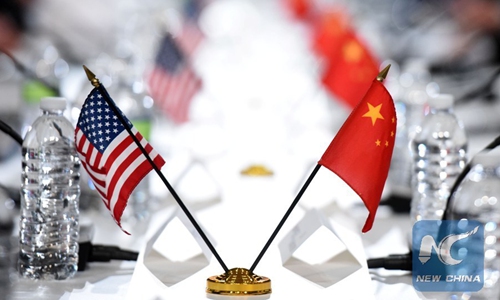Amazed to witness China’s rise first hand

Photo: Xinhua
This year marks the 70th anniversary of the founding of the People' s Republic of China. It was an honor to attend the October 1st celebration in Beijing and to see the proud nation celebrate an amazing rise.
My first trip to China was in 1975. I've been back over 140 times over the past 44 years and witnessing China's rise has had a huge impact on my life. To put it simply, China's transformation has been amazing to witness.
In 1974, my father, George Herbert Walker Bush, served as the chief of the US Liaison Office in China. My siblings and I visited our parents in Beijing in the summer of 1975, toward the end of the Cultural Revolution. At that time, almost all Chinese people were poor and the country was isolated from the Western world.
Since the reform and opening-up in the late 1970s, Chinese people have enjoyed incredible benefits. More than 850 million people in China have been lifted out of poverty, and the size of the middle class is growing every day. With the growing wealth, every day freedoms have been constantly expanding as well: the freedom to travel abroad, the freedom to receive the best education anywhere in the world, and the freedom to enjoy a higher quality of life. These freedoms were unimaginable 44 years ago.
As part of my personal commitment to improving closer ties between the US and China, I give speeches as Chairman of the George H.W. Bush Foundation for US-China Relations. In the beginning of September this year, I participated in the "2019 China Development High-Level Forum Symposium" where I shared with the audience how impressed I am with the ability of the Chinese government to quickly and effectively address problems.
One great example is the issue of air quality. With industrialization and with more cars on the roads, Beijing's air quality was getting worse and worse. The Chinese central government working with local authorities has made big changes and the air quality has improved significantly.
Likewise, I have been impressed with how the government, all levels, is able to focus resources and change policies to respond to bigger concerns of the people including food safety, housing, transportation, and education.
A critical factor in China's success has been the stability of the central government and a reliable policy framework that has developed successive five year plans which have brought unprecedented economic growth and attracted large amounts of foreign investment.
Being a witness to China's peaceful rise has shaped my views on many things.
One core belief is that every country has different national conditions and is at different stages of economic development and, as such, there is no single system of government that works for every country. The Chinese system is working well for China and the US system has worked well for the US.
To say this in other words, the US system would not work for China, and the Chinese system would not be effective for the US.
The US-China relationship has hit a low point. I have advised that Chinese officials directly address concerns that are raised by its critics globally.
President Xi Jinping proposed the Belt and Road Initiative (BRI) in 2013. Many in the US allege that the BRI forces smaller countries that receive Chinese investments to become beholden to China in some nefarious way.
My impression is that the BRI is a multinational collaboration aimed at helping countries by upgrading their infrastructure including roads, schools, utilities, rail systems, and ports. If true, this is an important message that needs to be shared more widely to offset the anti-China propaganda.
This year also marks the 40th anniversary of the establishment of US-China diplomatic relations. During my father's life, he often said that the US-China relationship is the most important bilateral relationship in the world.
In fact, over these past 40 years, the US and China have both gained tremendously from close business, education, political, and cultural ties. The US economy has achieved steady growth and full employment and American consumers are enjoying affordable, high quality Chinese goods. At the same time, hundreds of millions of Chinese have escaped poverty and China has grown from a low-income country to the world's second-largest economy. Like any bilateral relations, there have been ups and downs over the years. But overall we have enjoyed a classic win-win result.
The US-China relationship has entered a challenging period. Problems such as trade issues, intellectual property theft, and market access are serious and need to be addressed. But they ought to be addressed with respectful and deep dialogue.
Sadly, a growing number of Americans regard China's rise as a threat to our economy and national security. The White House erroneously believes that running a trade deficit with China means that the US is losing and China is winning. This kind of zero-sum thinking is wrong.
The truth is that there is far more that we share in common than what divides us. Our deep friendship has been established over a long history and it is my fervent hope that the US-China relationship will return on to the right track in the near future.
We need our relationship to become more stable so that together we can address growing global challenges such as terrorism, infectious diseases, and promoting peace and stability in the region and the world.
The article is compiled by People's Daily reporter based on an interview with Neil Bush, chairman of the George H.W. Bush Foundation for US-China relations and son of the late former US president George H.W. Bush. opinion@globaltimes.com.cn